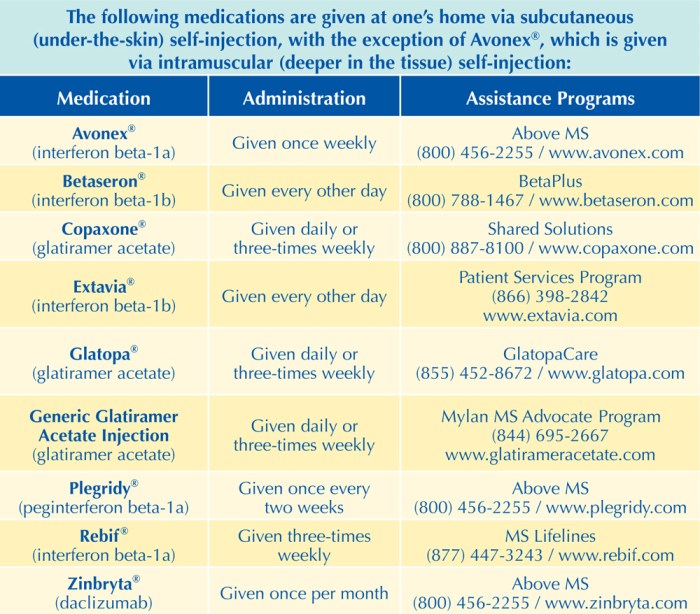
Delve into the world of Best Multiple Sclerosis Treatments Approved Worldwide as we uncover the latest advancements and treatment options available globally. From historic perspectives to cutting-edge therapies, this topic promises to be an enlightening journey for all readers.
Explore the various categories of treatments, the significance of early intervention, and the evolving landscape of multiple sclerosis care.
Overview of Multiple Sclerosis Treatments

Multiple Sclerosis (MS) is a chronic autoimmune disease that affects the central nervous system. Over the years, various treatments have been developed to manage the symptoms and slow down the progression of the disease.
Types of Treatments Available
- Disease-Modifying Therapies: These medications help reduce the frequency and severity of MS relapses.
- Symptomatic Treatments: These focus on managing specific symptoms such as fatigue, pain, and bladder problems.
- Physical and Occupational Therapy: These therapies aim to improve mobility, strength, and overall quality of life.
- Alternative Therapies: Some individuals may opt for complementary approaches like acupuncture or yoga to supplement traditional treatments.
Importance of Early Treatment Initiation
Early initiation of treatment is crucial in managing MS as it can help prevent further damage to the nerves and improve long-term outcomes. Delaying treatment may result in irreversible neurological damage and disability.
Goals of Multiple Sclerosis Treatments
- Reduce Relapse Rates: The primary goal is to decrease the frequency and severity of relapses, which can help prevent disability progression.
- Slow Disease Progression: Treatment aims to slow down the progression of MS by targeting the underlying immune response.
- Manage Symptoms: Symptomatic treatments help alleviate specific symptoms that can impact daily functioning and quality of life.
- Improve Quality of Life: Overall, the goal of MS treatments is to enhance the quality of life for individuals living with the disease.
Disease-Modifying Therapies (DMTs)
Disease-modifying therapies (DMTs) are a class of treatments specifically designed to alter the course of multiple sclerosis (MS) by reducing the frequency of relapses, slowing down disease progression, and minimizing the accumulation of lesions in the central nervous system.
Types of Disease-Modifying Therapies
- Injectable DMTs: These are administered through subcutaneous or intramuscular injections and include medications such as Interferons (e.g., Avonex, Rebif) and Glatiramer Acetate (Copaxone).
- Oral DMTs: These medications are taken orally and include Fingolimod (Gilenya), Teriflunomide (Aubagio), and Dimethyl fumarate (Tecfidera).
- Infusion DMTs: These treatments are administered intravenously, with examples like Natalizumab (Tysabri) and Ocrelizumab (Ocrevus).
Mechanism of Action of DMTs
Disease-modifying therapies work by targeting the immune system to reduce inflammation, prevent immune cells from attacking the myelin sheath, and modulate the immune response to decrease disease activity in MS patients. By doing so, DMTs help in preserving neurological function and delaying disability progression.
Commonly Used DMTs and Effectiveness
- Interferons: Interferon-based therapies have been widely used for many years and have shown to reduce relapse rates by approximately 30%.
- Fingolimod: This oral medication has demonstrated effectiveness in reducing relapse rates and delaying disability progression in patients with relapsing forms of MS.
- Ocrelizumab: As an infusion therapy, Ocrelizumab has shown significant efficacy in reducing disease activity and slowing down disability progression in both relapsing and primary progressive MS.
Symptomatic Treatments
Symptomatic treatments for multiple sclerosis focus on managing specific symptoms that patients may experience as a result of the disease. These treatments aim to improve the quality of life for individuals living with MS by addressing these symptoms directly.
Common Symptoms and Corresponding Treatments
- Fatigue:Medications such as Modafinil or Amantadine, as well as lifestyle modifications like exercise and adequate rest, can help manage fatigue.
- Spasticity:Muscle relaxants, physical therapy, and stretching exercises can help reduce muscle stiffness and spasms.
- Pain:Over-the-counter pain relievers, prescription medications, and physical therapy can be used to manage different types of pain experienced by MS patients.
- Cognitive Impairment:Occupational therapy, cognitive rehabilitation, and memory aids can help address cognitive challenges.
- Bladder Dysfunction:Medications, bladder training, and pelvic floor exercises can help manage bladder issues.
Improving Quality of Life
Symptomatic treatments play a crucial role in enhancing the quality of life for individuals with multiple sclerosis. By effectively managing symptoms such as fatigue, pain, and cognitive impairment, patients can experience improved overall well-being and function in their daily lives.
Personalized Symptomatic Treatment Plans
It is essential for healthcare providers to create personalized symptomatic treatment plans for MS patients. Each individual may experience a unique combination of symptoms and respond differently to treatments, emphasizing the need for tailored approaches to symptom management for optimal outcomes.
Emerging and Investigational Treatments
In the realm of multiple sclerosis treatments, researchers are constantly exploring new avenues and developing innovative approaches to combat this complex disease. From promising emerging treatments to ongoing clinical trials, the future of MS treatment options looks brighter than ever.
Let’s delve into the latest advancements in MS treatment research and what the future holds for patients.
Promising Emerging Treatments
- One promising emerging treatment for multiple sclerosis is stem cell therapy. This cutting-edge approach aims to repair damaged nerve cells and modulate the immune system to halt disease progression.
- Another emerging area of interest is the use of biologics, which are designed to target specific components of the immune system involved in MS pathogenesis, offering a more tailored treatment approach.
- Researchers are also exploring the potential of repurposing existing medications for MS treatment, such as antiviral drugs or anti-inflammatory agents, to provide new therapeutic options for patients.
Ongoing Clinical Trials
- Several clinical trials are currently underway to evaluate the safety and efficacy of novel treatments for multiple sclerosis. These trials aim to bring new therapies to market and improve outcomes for patients.
- Research is focusing on developing personalized treatment strategies based on genetic and environmental factors to optimize therapeutic outcomes and minimize side effects.
- New drug delivery methods, such as oral formulations or sustained-release implants, are also being explored to enhance treatment compliance and efficacy in MS patients.
Future of MS Treatment Options
- The future of multiple sclerosis treatment options may involve a shift towards precision medicine, where therapies are tailored to individual patients based on their unique disease characteristics and response to treatment.
- Advancements in biomarker research are paving the way for early diagnosis and personalized treatment selection, leading to better disease management and improved quality of life for MS patients.
- Collaborative efforts between clinicians, researchers, and pharmaceutical companies are driving innovation in MS treatment, with a focus on developing more effective and targeted therapies to address the diverse needs of patients.
Recent Advancements in MS Treatment Research
- Recent advancements in MS treatment research include the development of novel immunomodulatory agents that target specific immune pathways implicated in disease progression, offering new hope for patients with aggressive forms of MS.
- Researchers are investigating the role of gut microbiota in MS pathogenesis and exploring the potential of probiotics and dietary interventions to modulate the immune response and improve clinical outcomes in patients.
- Advances in neuroimaging techniques are enhancing our understanding of MS pathophysiology and guiding the development of innovative therapeutic approaches aimed at preserving neurological function and preventing disability progression.
Closing Summary
In conclusion, Best Multiple Sclerosis Treatments Approved Worldwide offer hope and progress for individuals battling this condition. The future holds promising developments that aim to enhance the quality of life for those affected by multiple sclerosis. Stay informed, stay empowered.
Commonly Asked Questions
What are disease-modifying therapies (DMTs)?
Disease-modifying therapies are treatments that target the underlying mechanisms of multiple sclerosis to slow down its progression.
How do symptomatic treatments improve quality of life for MS patients?
Symptomatic treatments help manage specific symptoms of multiple sclerosis, such as fatigue or muscle spasms, thereby enhancing daily functioning and overall well-being.
What are some promising emerging treatments for multiple sclerosis?
Potential new treatments like stem cell therapy or novel immunomodulators show promise in revolutionizing multiple sclerosis care in the near future.













